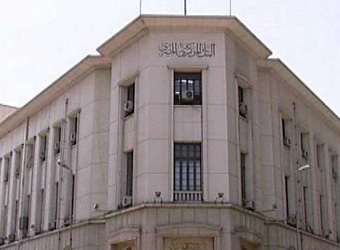Egypt’s central bank faces an uphill task keeping the country’s currency stable if mass anti-government protests planned over the coming days turn violent or drag on for too long.
A round of violent protests in December triggered a run on the Egyptian pound that cost the government over $2 billion to bring under control and caused it to abandon its policy of a freely convertible currency.
Opponents of President Mohamed Mursi have called for mass protests on Friday and Sunday to demand he step down after one year in office. Clashes in the last few days between his supporters and opponents have already left several people dead and scores injured.
“Politics has polarized, growth is poor, inflation is high and public finances are deteriorating,” said Simon Williams, an economist with HSBC. “In such an environment the currency is bound to be under pressure.”
Egypt has run through more than $20 billion in reserves, borrowed billions from abroad and delayed payments to oil companies to support the pound since the 2011 uprising drove away tourists and foreign investors, two of its main sources of foreign currency.
A new round of bloody and prolonged protests would only add to the pressure on a currency which trades on the black market at a discount of about 10 percent to the tightly controlled rates banks use to trade with each other.
“A very short period of time of social unrest would not have a sustained impact. But if this violence persists, you will see first pressure in the black market where demand will increase and then also in the interbank,” said Raza Agha, an economist for VTB Capital.
“If the social situation is so distressed that people are at home and not going to work and offices are not open, you’ll see a delayed impact,” he said.
To obtain foreign currency, many private importers now turn to the black market, where the pound has weakened by almost 20 percent against the dollar since the end of December.
A dollar now costs 7.70 pounds on the black market and about 7.00 pounds on the tightly controlled interbank market, compared to 6.18 at the end of December.
This has pushed up the price of imports, helping to boost consumer inflation to an annual 8.2 percent in May from 4.7 percent in December.
Economic grievances, including high inflation, were among the main causes of the popular uprising that ousted President Hosni Mubarak in early 2011.
Concerns about political unrest this week pushed the cost of insuring Egypt’s sovereign dollar debt against default to a record-high 865 basis points in the credit default swap market.
Capital Economics warned in a note last week that an increasing loss of confidence by investors could push the currency over the edge.
“There is a growing risk that the pound undergoes a ‘disorderly’ devaluation, whereby it could fall by as much as 50 percent in a matter of weeks,” it said in a research note last week.
Egypt’s foreign reserves stood at $16 billion at the end of May, equal to less than three months of import coverage, and much of this is made up of gold and other assets that would be hard to draw upon.
Egypt has been negotiating a $4.8 billion loan from the International Monetary Fund to help shore up its finances, but the government appears unlikely to take the unpopular austerity measures needed to secure agreement.
“At the moment I don’t think there is much momentum on either side, particularly in the present political environment,” said a Cairo-based diplomat who has been following the talks.
The government agreed on a series of tax increases with the IMF in November, but cancelled them during the December protests after coming under heavy criticism in the media.
The run on the currency in December sent officials rushing to Qatar, which threw Egypt a $2.5 billion lifeline to help it prop up the pound.
CURRENCY CONTROLS
Since then, the central bank has jettisoned its policy of a freely convertible currency and instead has been allocating its scarce foreign reserves through sales of $40 million dollars to banks three times a week.
Banks must limit these allocations for high priorities such as imports of essential commodities and supplies deemed crucial for manufacturing, Industry Minister Hatem Saleh said last month. Companies that needed dollars beyond this were free to turn to the black market, he added.
Medhet Khalil, chairman of Raya, the Egyptian agent for Nokia, Microsoft, Cisco and other technology suppliers, said his company has been forced to buy millions of dollars a month on the black market to import mobile telephones, computers and telecommunications equipment.
“So far it’s easy. It’s risky, but easy. It is illegal. Everyone is doing it,” he said in an interview.
He said earlier this year the dollar rose to over 8 pounds on the black market.
Any weakening of the pound on the black market would further complicate the lives of people and businesses already up against an onerous battery currency restrictions.
The central bank has limited Egyptians from transferring more than a cumulative $100,000 out of the country since the 2011 uprising unless they can demonstrate a pressing need for the funds. Many wealthier Egyptians have reached their limit and are no longer able to send funds abroad.
Depositors at banks can only withdraw a maximum of $10,000 in foreign currency per day under central bank rules, but in practice many banks restrict such withdrawals to much less and demand documents proving why the client needs the funds.
Egypt in December banned travelers from carrying more than $10,000 in foreign currency and prohibited them from sending cash through the mail.
Businessmen say the restrictions have spawned a series of subterfuges for getting money out of the country, including using dealers who buy foreign currency from Egyptian workers in Gulf countries who want to send Egyptian pounds to their families at home.
Source: Reuters


